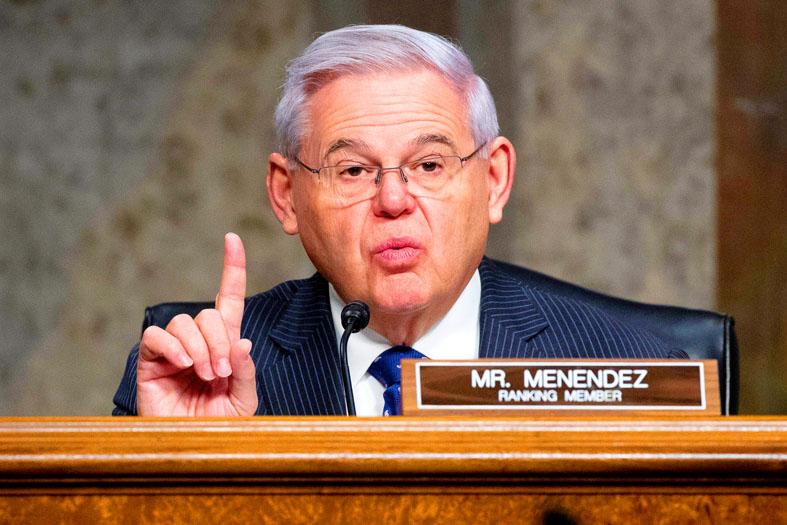The US Senate on Thursday passed a bill urging the US Department of State to develop a strategy to help Taiwan regain observer status at the WHO.
Introduced by US Senator Bob Menendez in March, the bill was approved by unanimous consent on the Senate floor, after it was approved by voice vote in the Senate Committee on Foreign Relations on Wednesday last week.
The bill described Taiwan as a model contributor to world health, saying that it has contributed more than US$6 billion to international medical and humanitarian aid efforts in more than 80 countries since 1996.

Photo: Reuters
Taiwan donated millions of personal protective equipment items and COVID-19 tests to countries in need last year, it added.
“Diseases know no borders, and Taiwan’s needless exclusion from global health cooperation increases the dangers presented by global pandemics,” the bill said, citing Taiwan’s efforts to participate as an observer in WHO events since 1997.
With support from the US and like-minded countries, Taiwan held that status from 2009 to 2017, the bill said.
However, Taiwan has not been invited to participate in WHO events after the administration of President Tsai Ing-wen (蔡英文) began facing increased resistance from Beijing on the international stage, it said.
If signed into law, the bill would direct US Secretary of State Antony Blinken to draft a strategy to include Taiwan in the World Health Assembly, the WHO’s highest decisionmaking body.
It would also require the secretary of state to report annually to the US Congress on the efforts.
The US House of Representatives passed a similar bill in March, and both chambers of Congress would have to agree on a unified version of the legislation before it could be signed into law by US President Joe Biden.
Bills on the inclusion of Taiwan in the WHO have been proposed to both chambers since 2017, without passing a vote until early this year.

CHAOS: Iranians took to the streets playing celebratory music after reports of Khamenei’s death on Saturday, while mourners also gathered in Tehran yesterday Iranian Supreme Leader Ayatollah Ali Khamenei was killed in a major attack on Iran launched by Israel and the US, throwing the future of the Islamic republic into doubt and raising the risk of regional instability. Iranian state television and the state-run IRNA news agency announced the 86-year-old’s death early yesterday. US President Donald Trump said it gave Iranians their “greatest chance” to “take back” their country. The announcements came after a joint US and Israeli aerial bombardment that targeted Iranian military and governmental sites. Trump said the “heavy and pinpoint bombing” would continue through the week or as long

TRUST: The KMT said it respected the US’ timing and considerations, and hoped it would continue to honor its commitments to helping Taiwan bolster its defenses and deterrence US President Donald Trump is delaying a multibillion-dollar arms sale to Taiwan to ensure his visit to Beijing is successful, a New York Times report said. The weapons sales package has stalled in the US Department of State, the report said, citing US officials it did not identify. The White House has told agencies not to push forward ahead of Trump’s meeting with Chinese President Xi Jinping (習近平), it said. The two last month held a phone call to discuss trade and geopolitical flashpoints ahead of the summit. Xi raised the Taiwan issue and urged the US to handle arms sales to

A magnitude 5.6 earthquake struck off the coast of Yilan County at 12:37pm today, with clear shaking felt across much of northern Taiwan. There were no immediate reports of damage. The epicenter of the quake was 16.9km east-southeast of Yilan County Hall offshore at a depth of 66.8km, Central Weather Administration (CWA) data showed. The maximum intensity registered at a 4 in Yilan County’s Nanao Township (南澳) on Taiwan’s seven-tier scale. Other parts of Yilan, as well as certain areas of Hualien County, Taipei, New Taipei City, Taoyuan, Hsinchu County, Taichung and Miaoli County, recorded intensities of 3. Residents of Yilan County and Taipei received

Taiwan has secured another breakthrough in fruit exports, with jujubes, dragon fruit and lychees approved for shipment to the EU, the Ministry of Agriculture said yesterday. The Animal and Plant Health Inspection Agency on Thursday received formal notification of the approval from the EU, the ministry said, adding that the decision was expected to expand Taiwanese fruit producers’ access to high-end European markets. Taiwan exported 126 tonnes of lychees last year, valued at US$1.48 million, with Japan accounting for 102 tonnes. Other export destinations included New Zealand, Hong Kong, the US and Australia, ministry data showed. Jujube exports totaled 103 tonnes, valued at